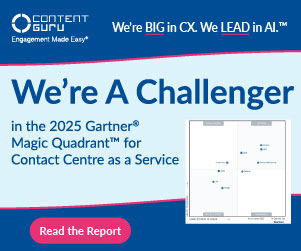Stuart Dorman of Sabio shares that blockchain technology has much to offer the customer experience (CX) community, but a realistic timescale is less clear.
Earlier this month I read about how Ofcom, the UK telecoms regulator, has received a government grant to examine how blockchain technology could be applied to improve the way that our phone numbers are managed. And, unlike most of the blockchain stories I see, it actually came across as a potentially useful application.
That’s part of the problem. For too long it has looked like a solution in search of a problem. In itself this should be nothing new, particularly as blockchain – launched as the database design introduced by Bitcoin – has now been around for ten years.
However, despite its relative longevity, blockchain has been the number one search term on gartner.com since January last year. So there’s clearly still a lot of interest in the technology, even though Gartner itself says it does not expect large returns on it until 2025.
According to Gartner, blockchain is busy progressing along its Hype Cycle for Emerging Technologies – and is currently just entering the ‘trough of disillusionment’. Despite this, the analyst firm sees it as a core component of future digitalised ecosystems, projecting that the technology will unlock a business value-add of over $3 trillion by 2030.
Clearly there’s value to be gained in scoping out potential benefits from future blockchain deployments. Ofcom, for example, says that it’s investigating the possibility of using blockchain to manage the one billion UK landline phone numbers that are either already in use or are waiting in reserve for future use.
Blockchain’s ability to preserve an accurate historical record of transactions, coupled with its open decentralised ledger capability has the potential to simplify the cost of managing phone numbers over the course of their lifetime.
Of course, blockchain also presents a significant opportunity for mobile phone number management. At a time when people are increasingly being identified by their mobile number, blockchain’s ability to support immutable records, transparent trust and transactional automation through smart contracts makes it a logical candidate for administrating not only our mobile numbers but also aspects of our digital identities.
As a mechanism for confirming identity, credit-worthiness and loyalty it certainly has implications for the CX sector, while also offering potential process improvements and greater control in key areas such as consumer switching and security.

Stuart Dorman
Given the pace of digital transformation, there’s obviously a growing requirement for a more distributed technology framework that can leverage both cryptography and an ability to provide an accurate historical trace of events to build indisputable records of digital activity over time.
Looking forward, blockchain certainly has the potential to handle the scale and complexity of these interactions – whether it’s going to be ready to support CIOs and their teams in the delivery of their immediate plans is an entirely different question.
For more information about Sabio - visit the Sabio Website
Author: Sabio
Published On: 7th Nov 2018 - Last modified: 26th Feb 2025
Read more about - Expert Insights, Call Handling, Sabio, Stuart Dorman






 Sabio Group is a global digital customer experience (CX) transformation specialist with major operations in the UK (England and Scotland), Spain, France, Netherlands, Malaysia, Singapore, South Africa and India. Through its own technology, and that of world-class technology leaders such as Amazon Connect, Avaya, Genesys, Google Cloud, Salesforce, Twilio and Verint, Sabio helps organisations optimise their customer journeys by making better decisions across their multiple contact channels.
Sabio Group is a global digital customer experience (CX) transformation specialist with major operations in the UK (England and Scotland), Spain, France, Netherlands, Malaysia, Singapore, South Africa and India. Through its own technology, and that of world-class technology leaders such as Amazon Connect, Avaya, Genesys, Google Cloud, Salesforce, Twilio and Verint, Sabio helps organisations optimise their customer journeys by making better decisions across their multiple contact channels. 











